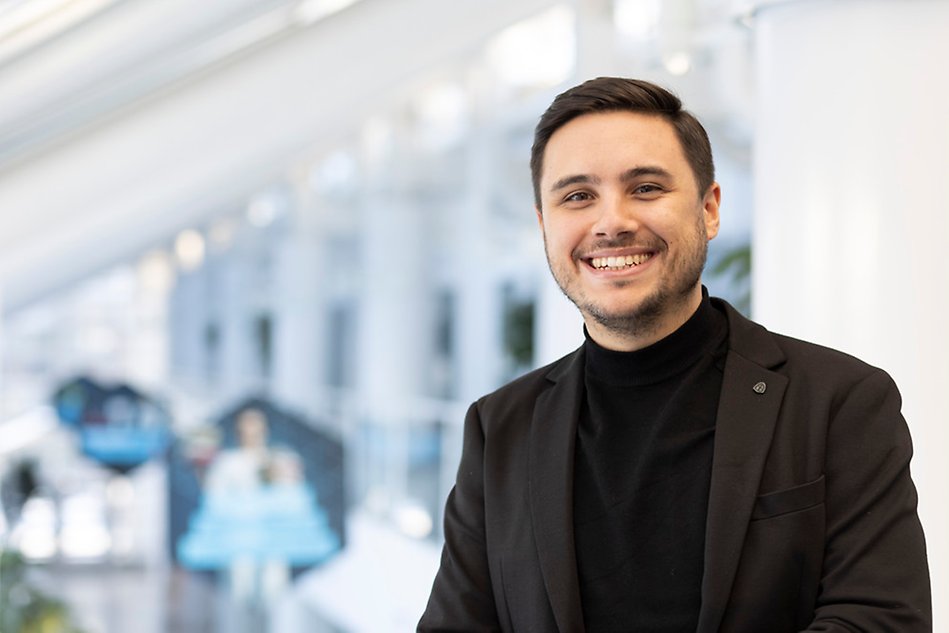Luís Irgang Dos Santos, Innovation Sciences
Luís Irgang Dos Santos is doing his PhD studies in Innovation Sciences, specifically Industrial Management and Innovation. He is originally from Brazil, and chose Sweden out of several options because he likes the way professors and scientists are respected by the Swedish society in general.

Luís Irgang Dos Santos.
Hi, Luís. What is your research field?
“I do research in Industrial Management and Innovation. The focus of my PhD is on Health Innovation – more precisely on how new products, services and systems tailored to improve healthcare quality are developed, diffused, and implemented. My research takes several different perspectives into account to explore how healthcare practitioners, hospitals, medical technology companies and other players interact. I also investigate how they organise knowledge, resources and routines to generate and capture value.”
What is it like to be a PhD student?
“It is very challenging. It takes several years to study a specific subject in enough depth to find knowledge gaps, formulate research questions that can be answered using a scientific method, collect and analyse data that help to challenge, corroborate and/or complement prior theories, and discuss research findings systematically to collaborate with the progress of science.
I think the best part is having the opportunity to be part of the international academic community by attending conferences, workshops, congresses, and joining collaboration projects with companies and universities, where I can present my research and discuss the implications of my research findings for society.
I also like the fact that I work with senior researchers who provide the support that I need and inspire me to become an independent scientist and teacher.”
What is a typical day like for you?
“As a PhD student, no two days are alike. Most of the time, my focus is on the creative process aimed at researching and writing scientific articles. In parallel, I plan classes, respond to students’ demands, and grade assignments and exams. I am always looking for courses, workshops, and webinars that can help me to improve my teaching and learning skills.
I have my own office and my work schedule is flexible. I prefer to work at night because it is quieter and that is when I feel that I am the most productive. However, I often attend fikas and lunches with my department colleagues. I enjoy socialising with them and, I always learn something new about academic life.”
You are originally from Brazil. What is it like to come to Sweden to do your PhD?
“It is a reality quite different from that in my home country. From several options, I chose Sweden because I like the way professors and scientists are respected by the Swedish society in general. It is possible to see that political decisions are often guided by discussions that begin in academia. In addition, the relationship between universities, companies and the government is formidable, and this facilitates the development of new knowledge that ultimately contributes to developing a more sustainable and innovative country.”
What is it like to teach?
“I am passionate about teaching. Teaching is what motivated me to enter academia in the first place. When I started my journey at Halmstad University, I did not have much experience, and I have to confess that teaching in another language scared me a little. In the beginning, I participated as a guest lecturer in some classes to learn how to organise and conduct the classes. I also took some courses and workshops on teaching and learning in higher education. But what really made the difference was the encouragement and support of my colleagues and supervisors, who engaged me in their courses so that I could develop my teaching skills.
Currently I teach topics related to Industrial Management and Innovation in English in Sweden, and in Portuguese, remotely, in Brazil. My goal now and until the end of my doctorate is to consolidate my career as a university lecturer, and, in a maximum of 10 years, start teaching these topics in Swedish as well.”
Do you have any advice for new PhD students?
“First of all, you need to love what you do. There will be challenging times, and fatigue and imposter syndrome can make you give up halfway through. If you do not like your research topic, your work environment and routine, your journey will be painful, and you will have a hard time enjoying it.
Secondly, I believe that resilience is the key to a successful journey. You need to be prepared to have your work assessed and criticised all the time, sometimes in a tough way. You may have papers rejected from conferences and journals, and perhaps your research findings may displease some people. However, you will be proud of every little achievement, and they will make you feel like a Nobel Prize winner. In that sense, it is important to take care of your mental health and to surround yourself with supportive colleagues and friends.
Last, but not least, always keep your cup filled with coffee, and your laptop battery charged.”
Text: Emma Swahn
Photo: Ida Fridwall

